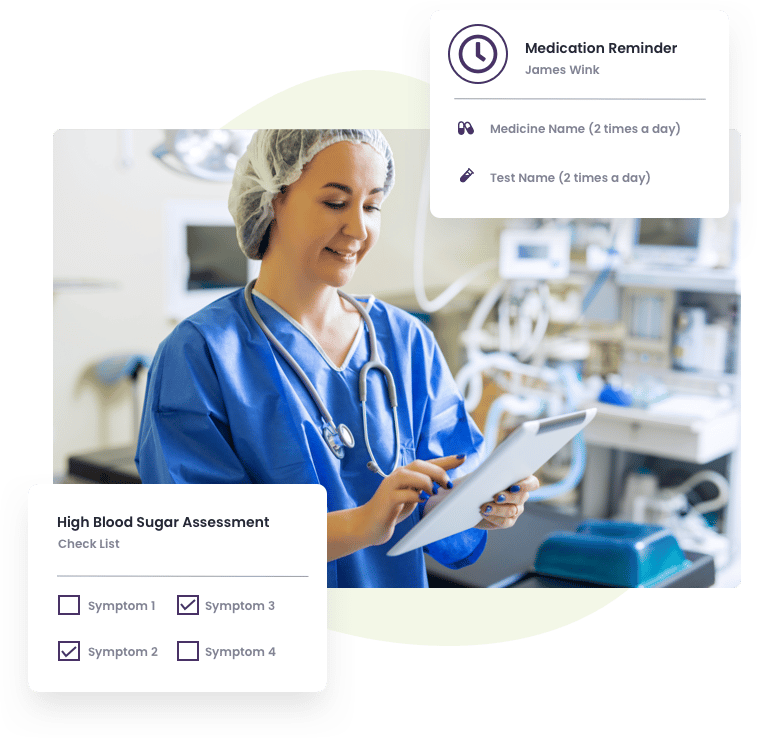Are You Looking For Confidential Help Available 24/7
- Access to the best rehab centers to overcome addiction
- Financial assistance program that gets you the help you need
- Clear answers to your questions on your road to recovery
07/17/2015|Narcotics.com Team
The issue of nurses abusing and becoming addicted to drugs is a very pressing one. When nurses experience a serious addiction syndrome, they are not only incapable of caring for their patients safely and effectively, but they also cannot take care of themselves. Fortunately, there are a number of different resources for nurses addicted to drugs and ways in which they can receive the treatment they need.
We can help you find treatment. Call toll free anytime.
Statistics & Facts On Substance Abuse In Nurses
- The rate of nurses substance use is normative with the general population estimates of substance use that is, between 6% and 8%.2
- 18% of nurses showed signs of substance abuse problems, while one-third of this population qualified for having a full-blown substance use disorder.2
- Substance abuse is still stigmatized in the field of nursing. Many nurses who recover from substance abuse issues tend to feel stressed about re-entering the healthcare field because of the restrictions placed on them upon reentry .1
- Many nurses report using substances to cope with stressors, or watching peers cope with stress by using substances.1
- Illicit and prescription drug use are most common in home health and hospice nurses and nurses who work in nursing homes.2
History Of Nurses And Addiction
Although substance abuse among nurses is level with that of the general population, it is still an issue that has existed for decades.
When fentanyl became available for clinical practice in the 1970s, hospital workers abused the drug. Nurses would draw the opioid from vials and replace it with saline. This led to overdoses and addictions within the profession.
For years, many nurses were disciplined by their state boards for drug and alcohol abuse. While researchers identified substance use disorders as treatable diseases, it was not a widely accepted theory. This led to an influx of firings rather than appropriate treatment.
Many hospitals did not offer addiction services until the 1980s, when state legislatures approved treatment options for healthcare professionals. Since then, organizations, such as the American Nurses Association , have provided information and education related to substance abuse.
Recommended Reading: Why Do People Have Addictive Personalities
Should I Choose A Residential Rehab
Treating addiction for a nurse could mean selecting a residential rehab facility. For individuals looking for addiction treatment options for nurses with a built in support system, residential rehab is very attractive. Most residential rehab facilities perform random drug tests and do not allow visitors overnight, reducing the opportunity for a potential drug relapse.
Knowledge Access And A Lack Of Supervision Protocol Help Addictions Thrive

Nurses, like most health professionals, understand medications, their interactions, proper dosage, and other facts about drugs that the general public does not know. While knowledge helps nurses care for patients, it can also factor into taking risks with their own health. That is what one nurse, who asked to remain anonymous, explained to WCNC NBC in North Carolina.
This wife, mother, and full-time nurse loved her job. After surgery, she realized that the pain medications prescribed helped her cope with anxiety issues that she had struggled with for years. Soon, she took advantage of lax hospital drug access policies which allowed her to skim as much as she wanted until, of course, she lost her job. She looks at that incident as a positive one in the long run because she entered a drug treatment facility and is earning her license back.
Recommended Reading: Can You Get Addicted To Ritalin
Nurse Addiction Signs To Know
Every addiction display signs and symptoms of substance abuse. When addicted to a substance, both internal and external effects occur.
- Excessive use of breath mints
Substance abuse among nurses doesnt just show up physically, but it also shows up in their work involvement and efficiency. As nurses struggling with substance abuse dig deeper into their addiction, theyll usually do things such as calling in sick, begin to build a reputation for tardiness, and even disregard their work shift as a whole.
If you can, notice the patterns and actions of a nurse who is struggling with substance abuse issues. Notice how off they might seem when comparing their usual self with how they are now. If you pay attention closely, you will see how the behavior of nurses struggling with substance abuse shows warning signs.
Lorem ipsum dolor sit amet, consectetur adipiscing elit. Ut elit tellus, luctus nec ullamcorper mattis, pulvinar dapibus leo.Lorem ipsum dolor sit amet consectetur adipiscing elit dolor
John Doe
Conveniently Curated Information From Other Top Sources
There are many resources available for patients and providers. Some are listed below for your convenience. The inclusion of these links does not imply AANP endorsement.
- NIDAMED: CE and clinical resources, including screening tools, opioid agreements and patient education materials.
- The National Academies of Sciences, Engineering and Medicine: The Medications for Opioid Use Disorder Save Lives consensus study report, available for free download to users with a login, offers a look into the effectiveness of and barriers to medication-based treatment for opioid use disorder.
Don’t Miss: Can You Get Addicted To Lexapro
Required Certifications Credentials And Licenses
The Certified Addictions Registered Nurse certification indicates a nurses proficiency in addiction-focused nursing. Though someone may work as a substance abuse nurse without this certification, it can improve the chances of employment. Some employers may require it. A nurse can take the CARN exam after completing 2,000 hours of addiction-related nursing and 30 hours of continuing education within the previous three years.
Attitudes Of Health Care Providers And Others
Addiction is often an emotional and uncomfortable topic for health care providers. Even popular media sometimes portray addicted individuals negatively. Persons who struggle with addiction often are depicted as criminals or prostitutes, weak, lazy, and morally corrupt.
Current society stigmatizes addiction, and nurses are susceptible to the same ways of thinking about persons with addiction. Howard and Chung reviewed 30 years of research on nurses’ attitudes toward persons with addiction. While some improvement had occurred over time, many nurses still held negative views of individuals who abuse substances. In fact, nurses were more judgmental than were other health care workers. In a newer study of nurse and physician attitudes regarding injection drug users in New Zealand , care providers who believed users were in control of their addictive behavior attributed other health care conditions suffered by the user to the drug use. In a study of nurses in the United Kingdom, Monks, Topping, and Newell found most of the interviewed nurses had negative views of injection drug users.
Also Check: How Long Does Addiction Last
How To Become An Addiction Or Substance Abuse Nurse
Learn about our editorial process.
Are you ready to earn your online nursing degree?
Drug addiction is one of the most significant public health issues facing the U.S. today. The Substance Abuse and Mental Health Services Administration reports that 21.4% of people over age 12 had used illicit drugs within the past year and when alcohol and tobacco are included, that number jumps to over 58% within the past month. Not everyone who uses drugs or alcohol becomes addicted, but more than 40 million people have a substance use disorder.
Becoming an addiction nurse offers the chance to help those living with substance misuse disorders and their loved ones enjoy a happier, healthier future. From medical care in an inpatient unit to counseling in an outpatient treatment center, addiction nurses can play a critical role in providing help.
Use this guide for insights into how to get into this satisfying nursing specialty.
Peer Support Group Membership
The peer support groups meet on a weekly basis. Attendance is expected to be a 100% level of participation. The peer-support group membership is dependent on three guiding principles:
1. Confidentiality and anonymity of all group members.
2. Abstinence from all substance use chemicals for the duration of group membership.
3. Wiliness to participate in meetings that embrace a traditional 12-Step meeting format.
Once a nurse joins a support group, he/she receives a detailed package of information called “Participant Package.
As a basic overview of group membership, nurses will be held responsible to:
a. Adhere to group guidelines and expectations
b. Maintain confidentiality of group membership
c. Pay monthly financial costs associated with random drug screenings
d. Pay the nominal monthly financial costs associated with membership in the peer-support groups
e. Complete Quarterly Reporting and Drug Screens. Once a nurse joins the GNF-PAP program, he/she will be accountable for the completion of all quarterly reporting documents required by the Board of Nursing.
Recommended Reading: Drugs Of Addiction Act On The Limbic System
What Happens During Rehab
There are several different phases patients must undergo to complete their rehabilitation process. The first process is intake and assessment, where personal factors that contribute to the addiction are found. Patients must be open and honest in order to complete this phase.
The next phase is detox. During detox, patients symptoms are managed while they are moved off of the drug, until the drug is no longer in the patients system. The next phase is addiction treatment, which usually consists of psychotherapy. Psychotherapy sessions help to create a positive environment for patients to prevent future relapse. Patients then go through specialized care and aftercare phases. During the specialized care phase, patients plan on how to limit their risk factors and live clean outside of the facility. During the aftercare phase, patients put their plan into action outside the facility with support from staff.
Protect Your Nursing License

Youve worked hard to earn your degree and nursing license. You spent years getting to where you are today. Do you want all of that time, energy and dedication to go to waste? If you dont seek help, eventually your drug addiction will lead to consequences that may include a revoked nursing license. Dont let that happen.
You May Like: How To Get Rid Of Fast Food Addiction
Drug And Alcohol Abuse And Nurses: The Ease Of Covering It Up
Nurses who have addictions may have an easy time covering their tracks. This is why so many of them continue to abuse drugs and alcohol for such a long time.
There are many ways for nurses to obtain prescription drugs while working. There are specific medication nurses on some nursing units who dispense all medications to patients during their shifts. They handle pills in pill form and provide patients with morphine injections, IV medications, and other necessary drugs. In other nursing units, nurses are responsible for giving medications to their patients as necessary. Either way, there are no barriers to nurses getting the prescription drugs they need when they need them.
Nurses can pocket unused pills for their personal use, and some will even give their patients partial doses of medications so that they can keep the rest for themselves. Or, they can put it in their pockets and use it themselves in the bathroom. In these situations, nurses can easily take a vial of unused medication home with them that should have been wasted.
This ease of access to substances can help fuel the temptation to misuse prescription medications and increase the risk of addiction in nurses.
Philosophy Statement And Beliefs
Don’t Miss: Dior Addict Lip Tattoo 771 Natural Berry
The Nurses Guide To Addiction And Mental Health Help
Nursing is a challenging job on many different levels. Caring for patients can be exceptionally draining, especially in hospitals where the ratio of nurses to patients is less than ideal. In addition, nurses are often tasked with emotionally charged tasks, like working with terminal patients or speaking with family members about patients who may not survive. Many nurses work twelve or sixteen-hour shifts, and some even work nights, making it difficult to have a normal life when not on the job.
While nursing is certainly a rewarding career for those with the aptitude for it, its far from an easy job. And, unfortunately, a stressful job like nursing can lead to a propensity for mental health issues and substance abuse problems. Nurses that dont have proper stress outlets may find themselves depressed, anxious, or tempted by drugs or alcohol to manage the pressures facing them. PTSD in nurses is also common, especially after loss of a patient.
The nature of nursinga medical job in which professionals are expected to be responsiblealso makes it unlikely that nurses facing issues will speak up. Some may feel as though being honest about problems will put their jobs at risk, while others may feel too ashamed or guilty to admit a need for help.
Nurse Addictions Lead To Suffering Patient Care
The biggest effect is their performance involving patients. Patients are there to get help from medical professionals. However, if there is an issue with substance abuse in nursing, the patients care and longing for it decreases. Professionals end up spending more time trying to get themselves together rather than caring for someone in need.
Addiction can affect anyones work performance, making them seem irritable or disengaged. In the case of nurses, this is liable to cause an uncomfortable or tense feeling between the nurse, staff, and patients.
Patients might not get their required medicine or other treatments on time because of a nurses sluggish work. The nurse might not even tend to the patient at all, constantly calling for assistance.
Recommended Reading: St Joseph’s Addiction Treatment Malone Ny
Coworkers Will Respect You More
No matter how hard you try to hide it, theres a good chance your coworkers are aware of your addiction. Dont think that seeking help for your drug addiction is embarrassing or will cause others to look down on you. If your coworkers are decent people, they will feel proud that you are stepping up to improve your life, and they should respect you for your decision.
Georgia Board Of Nursing Authority
The Georgia Board of Nursing recognizes that nurses may require a substance abuse recovery program due to the result of use of alcohol, drugs, narcotics or other mood altering substance.
In order to fulfill its purpose of protecting the public, the Board is granted the authority by law to discipline the license of the recovering nurse. The Board also has authority to condition the penalty based upon the nurse’s entry into and completion of a definitive alcohol and drug treatment program. Based upon documentation provided by treatment rehabilitation advocates, the Board considers probation, as opposed to revocation of the nurse’s license. Probation carries with the Board imposed measures for monitoring the work performance and continued recovery of the nurse. The Board’s progressive policy regarding the recovering nurse does not preclude its regulatory responsibilities therefore, the Board continues to expect timely reporting of any apparent problems that could become a danger to the public.
Read Also: What Are The Steps To Drug Addiction
Add This Infographic To Your Site
< p style="clear:both margin-bottom:20px "> < a href="https://onlinenursing.duq.edu/blog/substance-abuse-nursing-introduction/" rel="noreferrer" target="_blank"> < img src="https://s3.amazonaws.com/utep-uploads/wp-content/uploads/DUQ-MIG/2017/08/25131026/Substance-Abuse-Nursing-An-Introduction-Final.jpg" alt="Substance Abuse Nursing An-Introduction Infographic" style="max-width:100% " /> < /a> < /p> < p style="clear:both margin-bottom:20px "> < a href="https://onlinenursing.duq.edu" rel="noreferrer" target="_blank"> Duquesne University < /a> < /p>
Guided Meditationwednesday September 21

Meditation is a simple and effective approach to training and quieting the mind for a period of time to build awareness, attention, and relaxation. There are numerous scientifically-proven health benefits to the practice, including stress reduction, enhanced self-awareness, and improved happiness and general well-being.
Instructor: Catherine DirkxRegister today for this online event
Don’t Miss: Pain Medication For Recovering Addict
Working As An Addiction Or Substance Abuse Nurse
The variety of potential employers, from public hospitals to private treatment centers, means that addiction and substance abuse nurses can typically find a wide array of entry-level positions. The different types of job settings also mean that job responsibilities and earning potential for addiction nurses vary.
According to data from Payscale, addiction nurses earn an average annual salary of $86,000. The average hourly wage is $36.63 as of June 2022. Nurses with bachelor’s degrees and certification, in particular the CARN-AP designation, have the potential for higher salaries.
Addiction And The Nursing Profession
Nurses deal with problems and issues that most people would have difficulty doing. They often find themselves having to take extra shifts, cover for colleagues, and rearrange their entire day to accommodate the needs of their jobs. They are trained to be quick, efficient, and effective multi-taskers. The nursing profession deserves to be honored and admired. So, why are nurses and addiction so often related?
Nurses and RNs are at high risk of addictions for many reasons, including:
- Their jobs are very demanding and require a high level of concentration.
- They often work long hours and have difficulty sleeping and waking up.
- The stress of spending so much time away from their families may be causing them to turn to substances.
- Hospitals, doctors offices, and clinics make medications and the tools to administer them very accessible.
- Many nurses suffer from mental illnesses, which they may self-medicate with drugs or alcohol.
Are you an RN or a nurse with an addiction to drugs or alcohol? You need to know that you are not alone, and nurses addiction treatment programs are available to help you quit using.
Recommended Reading: Name Three Types Of Treatment For Drug Addiction
